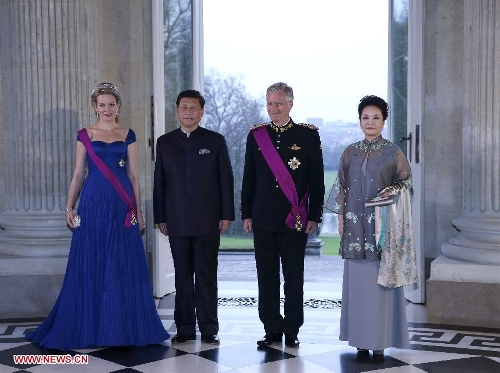Xi deepens EU strategic ties

Chinese President Xi Jinping (2nd L) and his wife Peng Liyuan (1st R) are welcomed by Belgian King Philippe and Queen Mathilde at the Laeken Palace upon their arrival for a state banquet in Brussels, Belgium, March 31, 2014. (Xinhua/Pang Xinglei)
President Xi Jinping on Monday proposed that China and the European Union (EU) should build partnerships for peace, growth, reform and civilization during a visit to EU headquarters in Brussels.
It was the first visit by a Chinese president to EU headquarters over the nearly four decades since China established diplomatic ties with the EU.
During talks with European Council President Herman Van Rompuy, Xi said China sees the EU from a strategic level and is willing to expand and deepen the comprehensive strategic partnership with the EU.
"This is an important message I've been sending during my Europe tour," he said.
Xi has proposed new strategic ideas about the China-EU relationship and its role in the multipolar world, said Qu Xing, director of the China Institute of International Studies, referring to Xi's remarks about the developing partnerships.
"The two sides can be called a community of common destiny considering their extensive trade, personnel exchange and dialogue," Qu told the Global Times.
The EU is China's biggest trade partner and China is only behind the US in trading with the EU. Trade volume between the two reached $559 billion in 2013 and is expected to hit $1 trillion by 2020.
China is in the process of advancing major reforms after a key Party plenum last year and the EU is recovering from the euro crisis. The two sides signed the 2020 Strategic Agenda for Cooperation in November and launched negotiations over a comprehensive investment agreement set to help business activities and improve China-EU trade links.
"In addition to more than 50 sectors of cooperation between China and the EU, cooperation has been expanded to other fields such as urbanization, maritime cooperation, developing the Arctic, cyber security and e-commerce," Qu said.
Xi is expected to clarify to EU leaders China's new demands on issues of core interest such as arms sales to Taiwan, the Tibet question and human rights, said Qu, although the official press release by China's foreign ministry made no mention of these points.
Despite the progress in China-EU relations, there are challenges facing the two sides.
Frictions over trade have periodically disrupted bilateral ties. Days before Xi's European tour, the two sides clinched a deal that put an end to a dispute over Europe's wine exports to China and also addressed a row over polysilion for solar panels.
Many in the EU are afraid that more openness to China would harm their own edge in technology and only give very limited access to China's market, Shi Zhiqin, an expert on European issues with Carnegie-Tsinghua Center for Global Policy, told the Global Times.
In addition, the EU has not fully understood China's own model of governance and development and still has doubts about a rising China.
Michael Emerson, an associate senior research fellow with the Center for European Policy Studies, said to many Europeans, China has a touch of arrogance and revanchism, which comes at a time of a much more aggressive revanchism by Russia. This is a worry for Europe, Emerson told the Global Times by e-mail, referring to China's territorial disputes with neighbors.
During a meeting with European Parliament chief Martin Schulz, Xi said on Monday, "We hope the EU can give more understanding and support to China's peaceful development and put more trust on China's strategic direction."